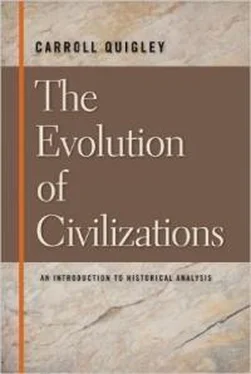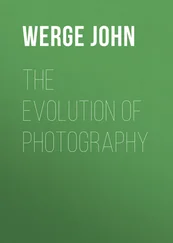The conquest of Phoenicia by Persia in 538 B.C. made these great seafaring people a satellite state of Persia, and squeezed the Greeks into the central Mediterranean between Persian pressure from the east and Carthaginian pressure from the west. Since the Persian fleet was largely Phoenician, this pressure on Classical civilization, from both east and west, was pressure from Canaanite culture. This pressure was greatly relieved in 480 B.C. when the western Greeks, led by Syracuse, defeated the Carthaginians at Himera in Sicily and the eastern Greeks, led by Athens, defeated the Persian fleet at Salamis. As a result of these battles Classical civilization was free to determine its own fate until later it finally destroyed the Persian-Phoenician system (333 B.C.) and the Carthaginian-Canaanite system (146 B.C.).
We have indicated that an Age of Expansion frequently is a period of science and of democracy. This was certainly true of Classical civilization. The rise and fall of Greek and, later, of Roman democracy is a familiar story. Science, on the other hand, had two peaks, both in the Greek period and in no way associated with the shape of the Mediterranean basin or the relationship between core and peripheral areas. These two peaks are generally known as Ionian Science, from about 600 B.C. to about 400 B.C., and Hellenistic Science, from about 350 to 150 B.C. A link between the two was provided by Aristotle's Lyceum.
Any Age of Expansion has strong trends toward rationalism because of the need to make decisions between alternative actions in a period when status is being disrupted and social atomism is prevalent because of expansion. Nevertheless, science (which is, of course, entirely different from rationalism because of its faith in observation) usually flourishes in an Age of Expansion and is killed off by irrationalism in the following Age of Conflict. In Classical antiquity this pattern was not followed. There, rationalism was very strong in the Age of Expansion and began to attack science while this period was still in progress. In the following period, science was destroyed, not by irrationalism, but by rationalism. The reason for this aberration in the pattern lies in the fact that in Classical antiquity rationalism became allied with oligarchy and shared in its victory over both science and democracy. The importance of this on subsequent intellectual history, especially our own, can hardly be overemphasized. It deserves a more detailed examination.
We have already said that reality is not completely rational because it consists of continua. Such continua are nonrational and nonlogical. They can be handled by various techniques all of which ultimately fall back on observation through the senses. Such continua can be dealt with simply by action; so that when a man runs or plays tennis we can say that he is dealing successfully with the continua of space and time. Such activity is based on the use of the senses (observation) plus unconscious (neurological) mental processes. These unconscious mental processes are, of course, nonrational (although not always "irrational") and nonlogical. Or, in the second case, we can deal with such continua rationally and logically by dividing them, as we did with the rainbow, by arbitrary and imaginary divisions into gamuts to which we attach rational labels. We then deal with these labels (or categories) by rational processes, but the verity of the conclusions reached by these processes must be checked through sensual observation. A third method of dealing with reality is by pure rationalism, but before we consider this we must say a few words about the Greek effort to use the second method to develop a scientific approach to reality.
It is generally recognized that science, as we understand it, was born, but never fully developed, among the Greeks. It began to develop among the Ionians about 600 B.C. with the work of men like Thales of Miletus (ca. 624-547). About a century later the optimistic beliefs of the Ionian scientists began to be challenged by a number of thinkers who argued that reality was much more complex than was believed and that its nature varied with the point of view of the observer so that, for example, what seems warm to one observer seems cool to a different observer (or even to the same observer at a different time) so that we cannot say what is really warm or cool. The chief figure in this development of profound doubt was Heraclitus of Ephesus.
Heraclitus was obsessed with the dynamic qualities of observed reality, or, as we should put it, with the inability of man to deal with continua by any processes based on sensual observation. "All is flux," he said. Or again, "You cannot step into the same river twice." By this last statement he meant that the river is always changing. If we step into a river even a second after we stepped into it the first time, it is a different river. The first time we step into it, it is the river-we-have-not-yet-stepped-into, while the second time we step into it, it is the river-we-have-already-stepped-into. These are clearly different rivers, but they are different for other reasons as well. The second time, it is a different river because some of its water has flowed to the sea and been replaced by different water, the fish and plants in it have moved, and its bed and banks have worn away (however slightly). Obviously, it is not the same river. Although our senses can discern the changes only at the end of a long lime, it has changed somewhat in any time however brief. Similarly, it changes in space. We walk along its bank and say, "Here is the river." But soon it is very narrow, and we say, "Here is the brook." Yet nowhere can we find a spot or a line which separates the river from the brook or the brook from the rill. We say that John's body is renewed every seven years, its material being completely eliminated and replaced by new material. This process must go on constantly so that at the end of any time, however small, John is a different person. We thus have no right to expect debts to be paid, because we can never find the exact person to whom we made the loan, and anyone has the right to refuse to repay a loan on the ground that it was made to someone else. If we seek repayment after a long interval, say ten years, why should he not say: "You have the wrong person. I do not have in my body a single molecule of the person to whom you made the loan ten years ago"? Of course we might argue, in such a case, that the molecules might have changed but their configuration has remained the same, and the loan was made to the configuration, not to the sum total of molecules. The point of such a distinction between molecules and their configuration, somewhat like Aristotle's distinction between matter and its form, is that matter can be observed by the senses while the form has to be inferred by some mental process. According to these Greek nonscientific thinkers of the fifth century B.C., we can say nothing true or know nothing certain about the physical world of appearances. In this world "all is flux." But behind this material world there must be some nonmaterial unchanging reality that can be found by rational thought. According to Heraclitus this reality behind appearances must be logos, a pattern of logical rationality.
On the basis of arguments such as these there arose a school of rationalists following the teachings of Pythagoras (ca. 580-505 B.C.). To these Pythagorean rationalists the diversity and dynamics of the material world made it unknowable and outside the realm of possible discussion. But behind this "appearance of things," which was really illusion, was reality. Such reality was rational and logical. Accordingly, reality could be found by reason and logic alone, without any appeal to the senses or to observation. In fact, such an appeal to observation would merely distract a person from the unchanging, knowable, unity of rational reality to the constantly changing, unknowable, illusion of appearances. This dichotomy between appearance and reality became basic in the outlook of the Pythagorean rationalists such as Pythagoras himself, Socrates, Plato, or the early Aristotle. They insisted that knowledge could be obtained not by approaching the material world through the senses but by turning away from the material world (which was unknowable illusion) to reality (which was rational and knowable). Reality was to be found by the use of reason and logic alone, because it was rational and logical. This involved the unstated assumption that man's rational and logical mental activities run parallel to reality and reflect it without any physical link between them. According to the Pythagorean rationalists the rational and logical reality behind the world of appearances and found by the use of reason and logic without observation was the eternal, rational, and unified field of mathematics. Our knowledge of these things was not based on observation but on "reminiscence." Learning does not consist of putting anything into the mind but in recalling to the mind from its hiding place in the memory what the mind really knew all the while from some earlier existence or merely from its own structure. This process of remembering mathematics is demonstrated in Plato's Meno.
Читать дальше










